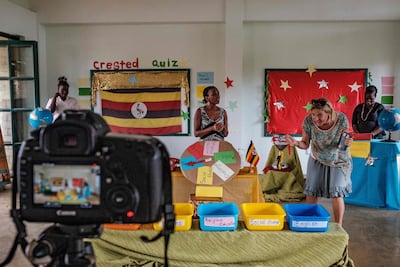So far, the year 2020 appears likely to be remembered for being surreal and tragic. It has been a difficult period for everyone, and students and educators have not been spared. An unexpected silver lining, however, has been the rapid adoption of digital technology in education. One experience from Jordan is particularly illustrative of this.
When the Queen Rania Foundation for Education and Development (QRF) launched Edraak, an online learning platform, in 2014, the regional and global education landscapes were far different from what they are now. It was one of the first mass-scale attempts to extend the renewed global interest in online learning to the Arabic-speaking world.
We launched Edraak to try and seize the transformative potential Her Majesty Queen Rania of Jordan saw in the power of online learning across the Arab world. At the time, the response by policy makers and educators across the region was mixed. As hundreds of online learners turned into hundreds of thousands before the culmination of Edraak's first year of operation, there was still an abundance of sceptics and critics who claimed to be concerned about the interplay between online and offline learning.
Now, in April 2020, with over 1.5 billion children affected by the global shutdown and millions learning online for the first time, we still don't believe that technology will replace face-to-face learning; however, we are more confident than ever that online learning will become part and parcel of every modern education system. Edraak's more than 3 million learners appear to feel the same way, with the platform's user numbers growing rapidly over the past three weeks.
As eternal optimists (you have to be if you are in the EdTech space), we are always trying to turn opportunities into challenges and to find hope in the midst of uncertainty. That's why we are heartened by the arguments of many experts that the response to Covid-19 will reshape our societies almost permanently and often for the better, shifting societies towards remote work, online learning, and other efficient trends.
For Edraak, our response to Covid-19 and the surge in digital learning has already taught us a number lessons.
Collaboration is essential when responding to crises
Jordan needed to rapidly build a virtual learning environment that provided the best possible resources to students, given time and other constraints. A national task force was created under the leadership of the education ministry that focused on launching a free and open platform to all school learners in the country. With the support of the Ministry of Digital Economy and Entrepreneurship, startups across Jordan joined the effort to create Darsak. The team at Mawdoo3, an Arabic online publisher, helped to set up the platform while startups Abwaab and JoAcademy joined Edraak in providing free content for learners.
Featuring content from all of the leading educational platforms in Jordan, the new platform was a textbook example of collaboration between three crucial players: government, the private sector, and non-profits.
Furthermore, internet network operators across Jordan came together to facilitate access to the platform by promoting its widespread use. It was a great example of multi-stakeholder collaboration that brought together different sectors of society around a shared goal: education for all.

Any education system is only as good as its teachers
The commonly held notion among educators that the quality of an education system is no better than that of its teachers is even more true online. Teaching and learning online require changes in mindsets and behaviour that cannot happen overnight because they necessitate dedicated teacher training efforts. The Queen Rania Teacher Academy and Edraak have been pioneering Arabic content in this space for years. Recently, they worked with Jordan's education ministry to launch a dedicated portal for teachers to improve their ability to do their work online in response to the Covid-19 crisis.
Build for scale
Crises make the wisdom of “building for scale” ever more imperative. Building for scale on the basis of well-documented processes and the right infrastructure means that you can quickly expand (and pivot) to meet the needs of online learners as they adapt to changes and increase in number. Since lockdowns were imposed across the Middle East region, new signups on Edraak have increased by over 400%. We couldn’t have done this without clear systems and structures that were ready for these developments.
The new UBI: Universal Basic Internet
As the global debate continues about the need to institute universal basic income schemes across the world (especially in response to the current crisis), it has also become clear that the world can no longer afford to treat access to basic internet as anything other than a human right. While there is still much to be figured out, whitelisting access – that is, providing uninhibited access – to basic services such as open educational resources is a promising start.
Most important of all is recognising the value of the individuals who make all of this work. We want to thank all the Edraakers for the tireless work they've put in over the past weeks and for everything we learn from them every day. We have always said the best part of the job is working with them and the inspiring environment they create. Never has that been more true.
Shireen Yacoub is the chief executive of Edraak.
Nafez Dakkak is executive chairman of Edraak.










